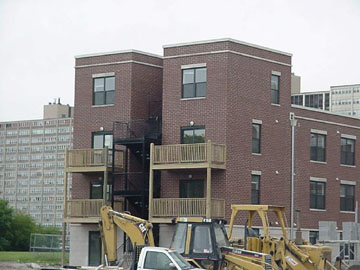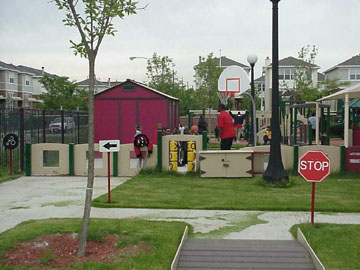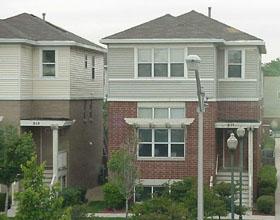MPC, in partnership with the Metropolitan Mayors Caucus, took a bus tour of successful housing developments featuring a range of options in the Chicago region.
Forty mayors and municipal leaders hit the road Thursday, May 31 to see a range of quality housing options in the metropolitan area. Task force members wanted to see a variety of successful affordable housing sites for themselves, to understand each initiative's goals and hear community acceptance stories and strategies. After reviewing the Housing Endorsement Criteria, a set of principles developed by MPC and other stakeholders to help municipal leaders attract, identify and build support for quality proposals, task force co-chair Mayor Rita Mullins of Palatine explained, "we need to see, first hand, some successful examples of the kinds of homes that meet the Criteria — housing many of us need in our communities, but which often faces community opposition."
The Metropolitan Mayors Caucus is a group of over 250 mayors whose mission is to improve the six county metropolitan region through the cooperation of area municipalities. So far, the Caucus has created task forces to address sensible growth, air quality and transportation issues. Late last year, the Caucus created a Housing Task Force to provide mayors with the opportunity to address housing-related issues in a regional context .
On the tour municipal leaders saw creative designs and approaches to address regionwide challenges to building, rehabilitating and enhancing the mix of quality housing options in metropolitan Chicago. After starting out in Chicago at the North Town Village and Homan Square developments, the group headed north to Evanston, Highland Park, Arlington Heights and Palatine. Participants saw the roles that private developers, nonprofit development organizations and active volunteers can play in creating more housing options to meet both local and regional objectives.
Results from the 2000 census confirm what MPC's Regional Rental Market Analysis found early last year: Metropolitan Chicago has been unable to keep up with the demand for rental housing. Since 1990 the region has lost more than 50,000 rental units while the population has grown by over 500,000 people. Job and population growth has especially boomed outside of Chicago, and approximately 50 percent of renter households and 12 percent of homeowners earn less than $32,000 a year, increasing the demand for housing affordable to the local workforce.
Jack Markowski, housing commissioner for the City of Chicago, pointed out that regionwide the private market alone cannot meet the demand for affordable housing. "Mayor Daley has made housing one of his top priorities, second only to education. It takes this sort of commitment from the top to attract the right developers and produce quality housing options for residents at all income levels."
North Town Village partners Peter Holsten and Hal and Geraldine Lichterman discussed the challenge of balancing the economic risks associated with their civic commitment to helping solve the city's affordable housing shortage. "Real subsidies from the City and the federal government are necessary. We are putting our own pocket books on the line to invest in a solution."

North Town Village
Community opposition to affordable housing stems from the very visible past failures of public housing. Poignantly, the tour showed leaders how effectively affordable housing can be interspersed with market rate housing. At North Town Village, market rate units sold within four weeks. Similarly, at Homan Square, municipal leaders were impressed not only with how mixed income housing revitalized North Lawndale, but also with the mix of retail and community development. A new YMCA day care center and a new community center are currently under construction.

North Lawndale YMCA Day Care Center (above), and Homan Square. 
While some initiatives are developed for the sake of profitable investment, others rely on community based nonprofit organizations to revitalize older housing stock. The drive through Evanston underscored the role that community development organizations can play in maintaining an older housing stock. The group saw one example in which the renovation of one "eye sore" on the block spurred the improvement of other properties, thus contributing to a sense of safety and stability in the neighborhood.
Tour participants spent lunch at the community space at Highland Park's Peers Senior Housing development. Mayor Dan Pierce explained how volunteer activism had created the city's powerful housing commission and its far reaching affordable housing plan. Highland Park's Affordable Housing Implementation Plan includes such innovative strategies as land trusts, trust funds, inclusionary zoning and employer-assisted housing.
King Harris, whose own company System Sensor started an employer-assisted housing program in west suburban St. Charles, was on hand to tout the benefits of using employer-assisted housing as a strategy for creating affordable housing and bridging the gap between where jobs are located and where workers can afford to live. "I was immediately attracted to the idea," Harris said, "because it seemed to provide a positive way to address key issues like employee retention, productivity and absenteeism." Employees are given a $5,000 loan that will be forgiven if they remain with the company for five years. "Our program has already enabled 22 employees at our St. Charles facility to become homeowners, most for the first time. They have been able to buy affordable homes closer to our plant. Our analysis of the program indicates that it has more than paid for itself in terms of reduced recruitment and training costs."
New State legislation now allows the Illinois Housing Development Authority to match an employer's investment in employer-assisted housing, expanding the potential of the program. Caucus housing ask Force co-chair, Mayor Zenovia Evans of Riverdale, is currently exploring an employer-assisted housing program for Riverdale city employees.
The day ended in the northwest suburbs where two mayors, Arlene Mulder of Arlington Heights and Rita Mullins of Palatine, discussed how housing is featured in their cities' redevelopment plans. Developer David Hill revisited earlier comments by Jack Markowski that "Mayoral leadership is critical but all the municipal commitment in the world will not meet demands for affordable housing if federal resources are not increased to expand and improve the available housing stock."